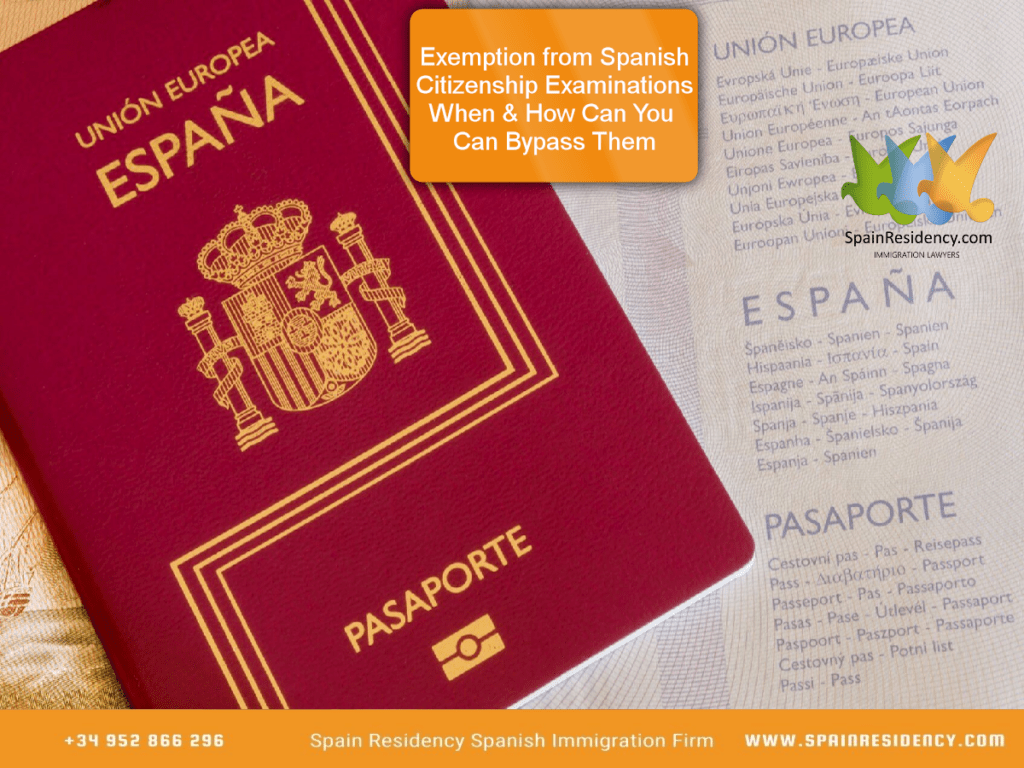Learn how to get Exemption from Spanish Citizenship Examinations and see how and when can you can bypass them?
Menu:
In this post we cover the following: (click any section to see its content)
- THE TWO DISTINTIVE ASSESMENTS »
- THE REGULATIONS »
- INITIATING THE WAIVER REQUEST PROCESS »
- FACILITATING SOLUTIONS »
In the years preceding 2015, the path to securing Spanish nationality necessitated a face-to-face interview at the Civil Registry. Yet, this approach held a glaring drawback: each registry charted its own course, resulting in a mosaic of procedures and inquiries. The level of complexity fluctuated, tethered to the specific locale of application.
In some instances, the interview assumed a straightforward demeanour, while in others, it morphed into a labyrinthine ordeal. Superseding this interview was a subjective report, crafted by a public official. This document would ultimately seal the fate of the application, determining its approval or rejection.
To change these inherent shortcomings and fashion a more standardized and objective evaluation mechanism to ascertain the degree of integration with Spanish culture and society, a comprehensive transformation transpired in 2015.
Here we explore how to get exemption from Spanish Citizenship Examinations
The acquisition of Spanish citizenship mandated the successful completion of two distinctive assessments:
- DELE Examination (Spanish Language Proficiency): At least an A2 proficiency level is requisite.
- CCSE Sociocultural Examination
This amalgamation of evaluations is the well-renowned Spanish nationality examinations, widely expounded upon within this discourse.
Every individual attaining legal adulthood (manifested at the age of 18 years within Spain) is obliged to undertake both examinations. Notwithstanding, exceptions do arise.
Consider, for example, those individuals whose native tongue aligns with the Spanish language. Hailing from a Latin American nation, this subgroup is absolved from the linguistic evaluation’s rigors.
Nevertheless, for the residual scenarios, a trio of circumstances may grant reprieve from the dual examinations, mandating the solicitation of an exemption and allow exemption from Spanish citizenship examinations.
The Paradox of Spanish Citizenship Exam Dispensation
The “dispensa,” a term of Spanish origin denoting a waiver or exemption, serves as the instrument of liberation from the dual examination mandate. Applicants for Spanish nationality, when warranted, are eligible to be absolved from the two requisite assessments via this document.
Applying for the “dispensa” mandates recourse to the Ministry of Justice, where a case-by-case evaluation is meticulously conducted, culminating in the issuance of this document.
In ensuing sections, a more in-depth scrutiny shall be directed toward the beneficiaries of this privilege and the specific scenarios encapsulated within, for the conventional norm compelling all foreigners to undertake both examinations prevails.
When executing the citizenship application and submitting it online, instead of proffering proof of examination success, candidates may upload this exemption document (or, as elucidated below, the certificate attesting to ESO completion).
Two categories of waivers ensue: the complete waiver and the partial waiver—a recourse deemed prudent in various circumstances.
The partial waiver, distinct from a total evasion, offers an alternative avenue. It permits an oral format for the examination, dispensing with the written modality.
Navigating the Nexus of Citizenship Exam Waivers
In consonance with prevailing regulations, three classifications of aspirants are accorded the prerogative to seek a waiver and thus evade the rigors of the examinations:
- Illiteracy or Limited Literacy:
This represents a prevailing justification for dispensation requests. - Learning Difficulties:
Foreigners grappling with learning obstacles are likewise eligible. - ESO Completion:
Applicants who have triumphantly concluded compulsory secondary education (ESO) within Spain.
Emphatically note that ESO credentials procured within Spanish high schools situated beyond national borders remain ineligible.
Initiating the Waiver Request Process:
The initial two circumstances outlined above necessitate adherence to a formal procedure to access the sought-after exemption. This entails the submission of a formal petition to the Ministry of Justice, wherein the entreaty for exemption is articulated.
Upon solicitation and subsequent approval, the Ministry orchestrates the issuance of the waiver. It is important to underscore that substantial delays may mar this progression, as several months are often expended—a potential impediment, given the necessity of affixing this document to the nascent stages of the citizenship process.
Should a partial waiver be granted, the aspiring candidate must await its receipt before embarking upon the examination, albeit in oral format.
A divergent trajectory is discernible with the final category—an expedited and uncomplicated avenue. In this instance, a distinct procedural layer is superfluous. The citizenship application can be tendered directly, accompanied by the ESO diploma (at the juncture where examination validation is mandated).
The completion of a four-year tenure in compulsory secondary education serves as a signifier of successful integration and assimilation into the Spanish milieu, corroborating the incumbent’s profound acumen concerning Spain.
Addressing Contemporary Challenges and Facilitating Solutions:
Two salient predicaments currently beset applicants seeking nationality, vis-à-vis the coveted waivers.
Primarily, the protracted processing and issuance timelines cast a shadow, oftentimes extending over the span of months. This, regrettably, deters myriad foreigners from embarking upon the citizenship pursuit, besieged by apprehensions of examination failure.
Conversely, the denial of exemption petitions—predicated upon the presumption that youth connotes the capacity to surmount literacy challenges—bedevils aspirants. The latter dilemma, however, is mitigated through the benevolence of the Ministry, automatically bestowing a partial waiver upon this specific demographic.
Amidst these exigencies, the singular panacea emerges in the form of sagacious counsel from a seasoned immigration attorney. Their sage guidance stands as an indispensable bulwark against these tribulations.
Would you like legal assistance with a Residency or Citizenship Application in Spain?
We are a Spanish Solicitor and assist our clients with all types of residency applications.
Permanent residency is obtained after 5 years of Spanish Residency through Self-Employed Residency, Digital-Nomad, Non-Lucrative Residency or Golden-Visa. This followed by 5 years as a permanent resident in Spain and means you can then obtain Spanish Citizenship with a Spanish Passport.




